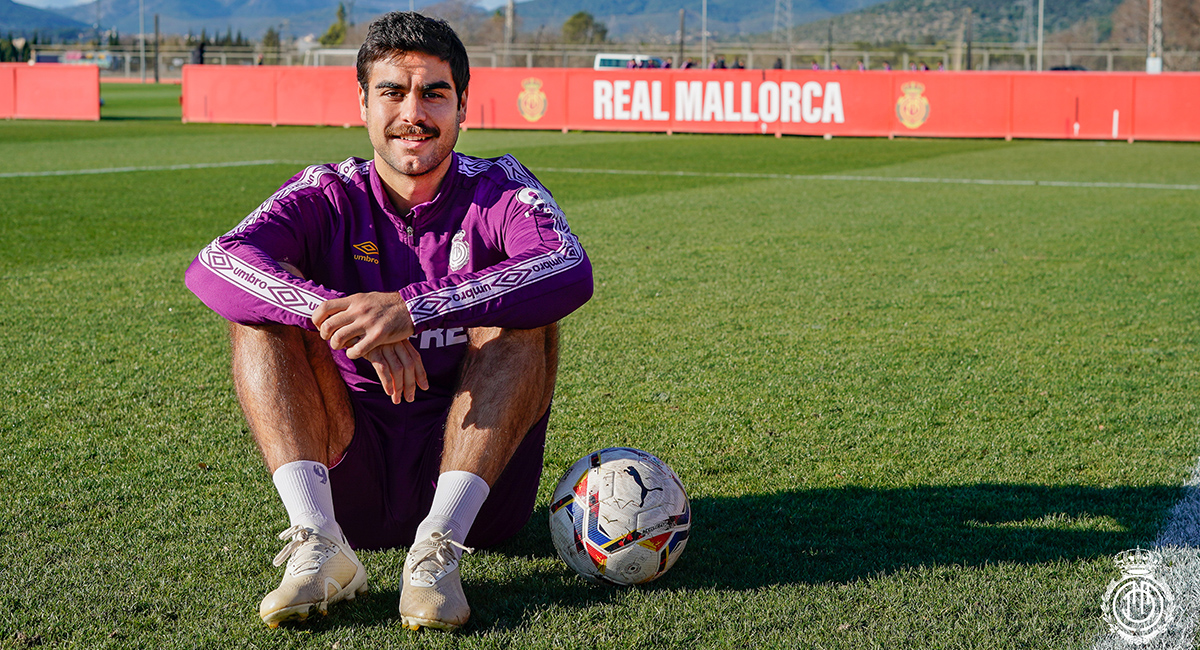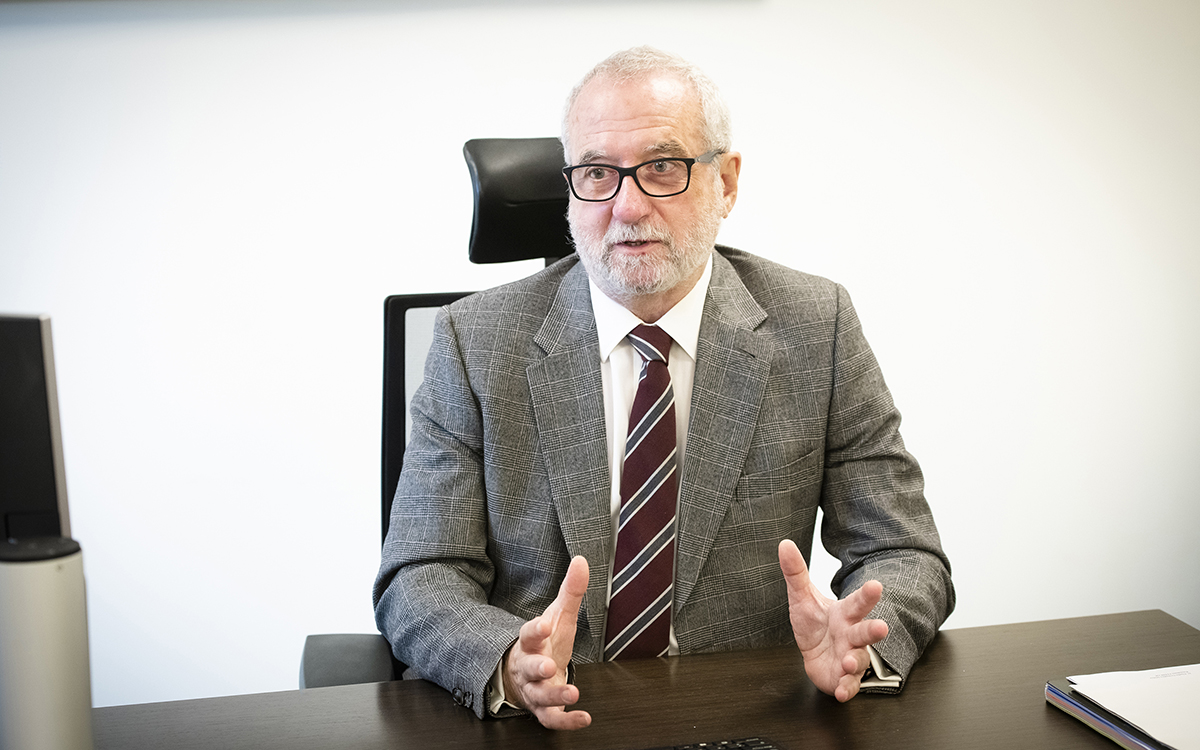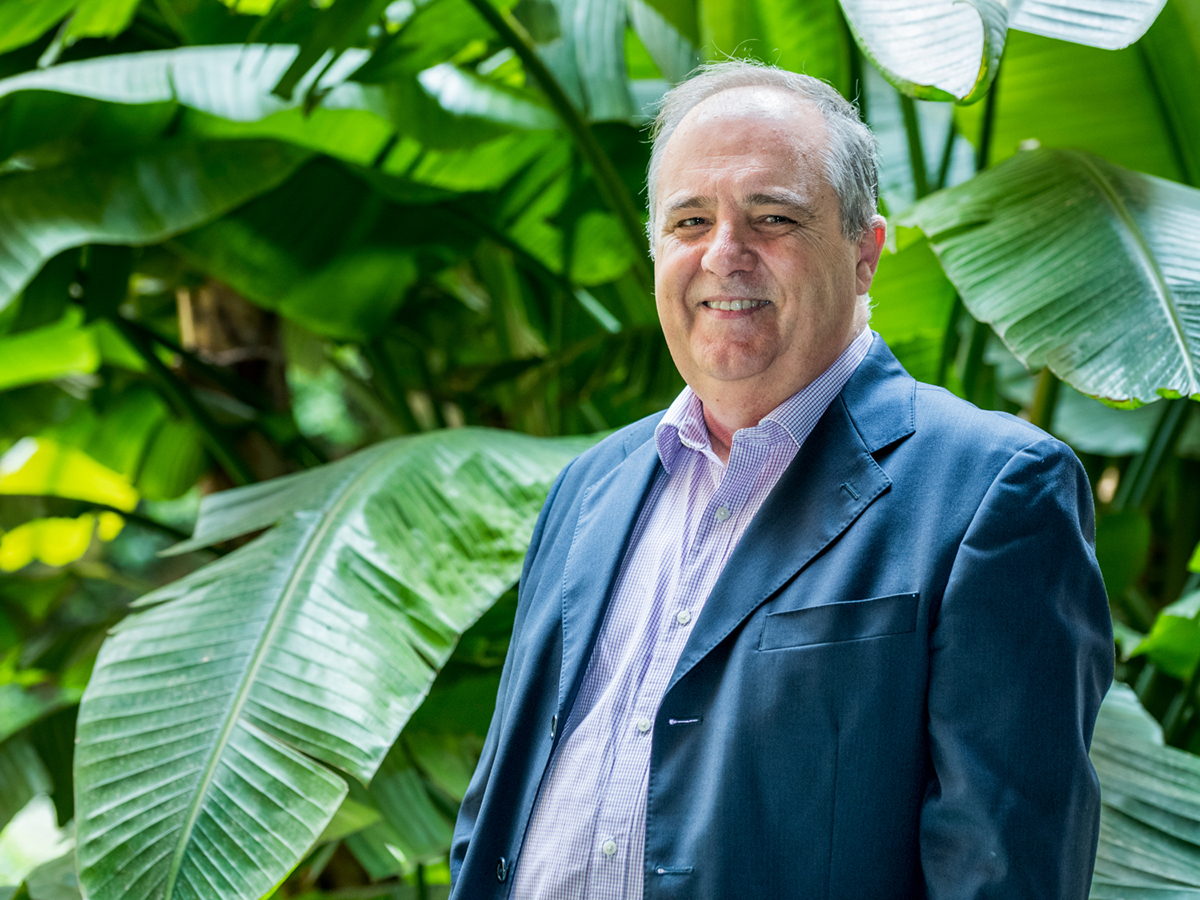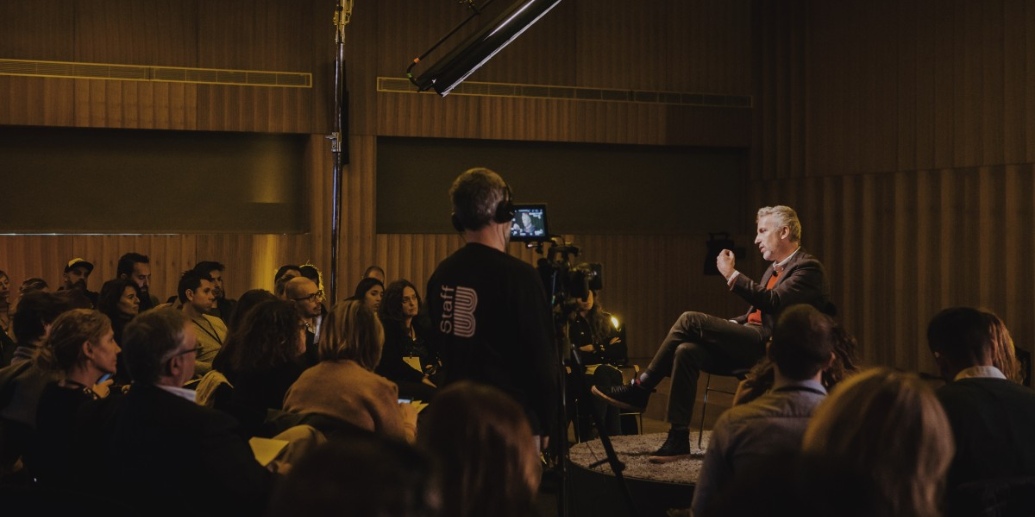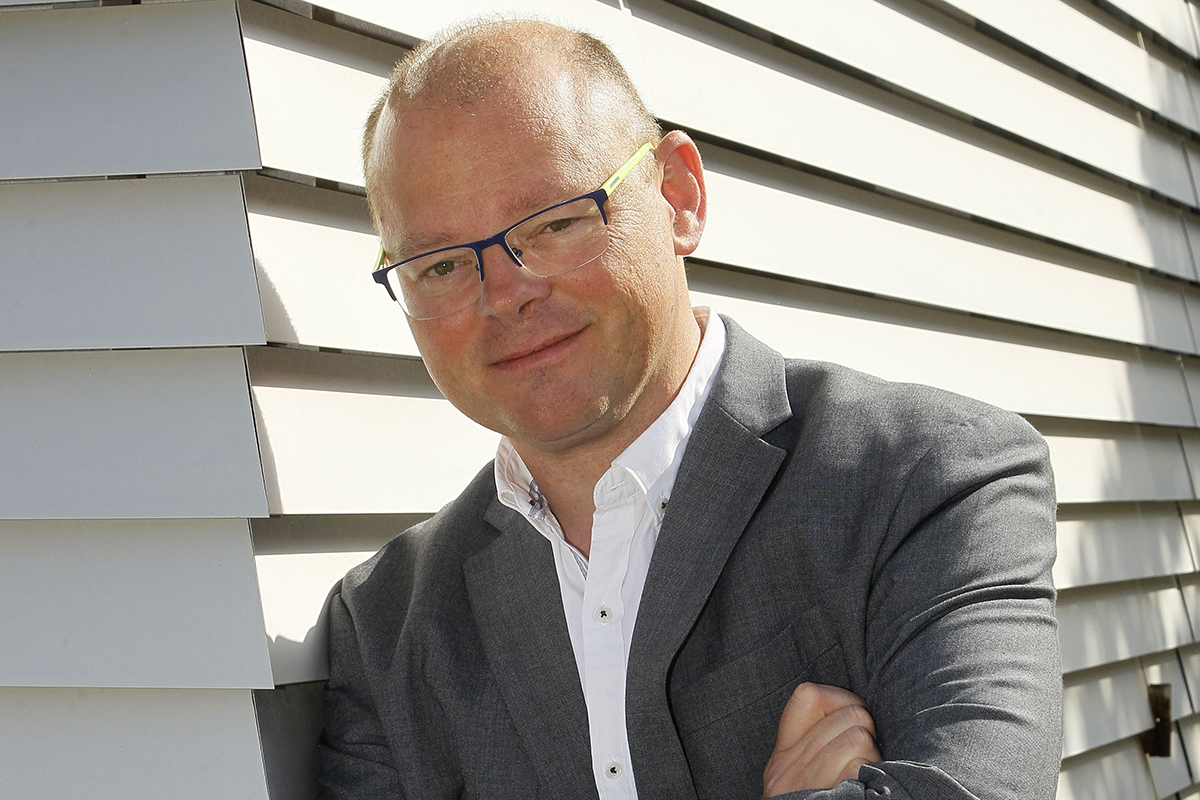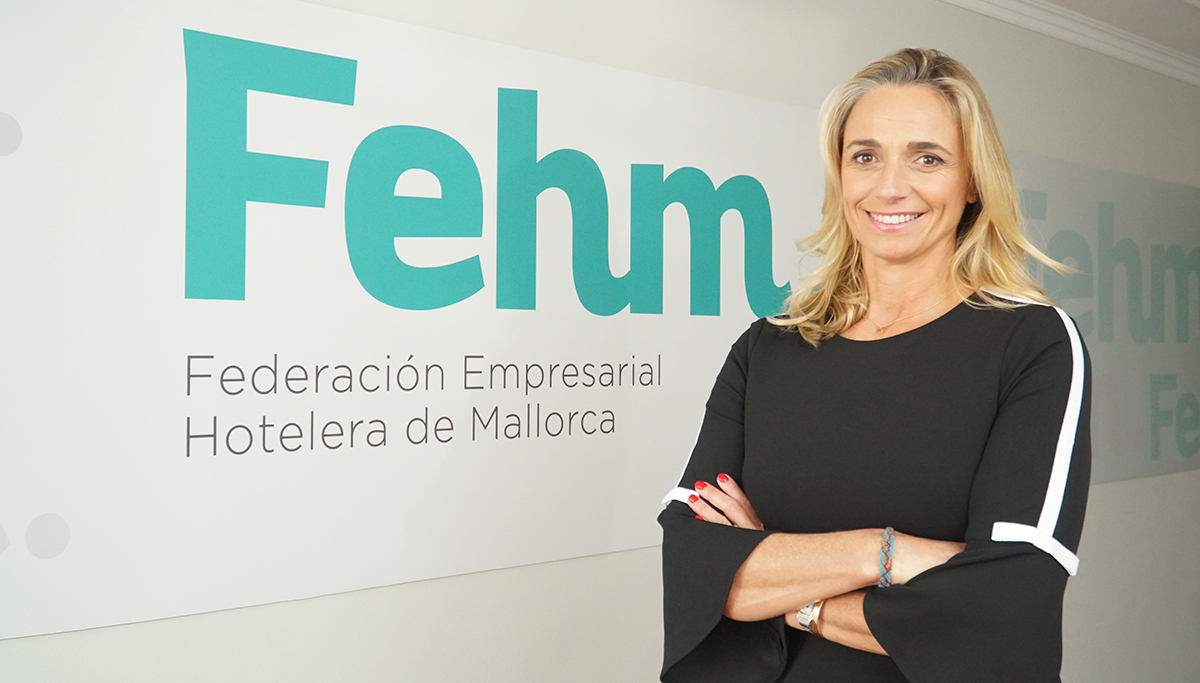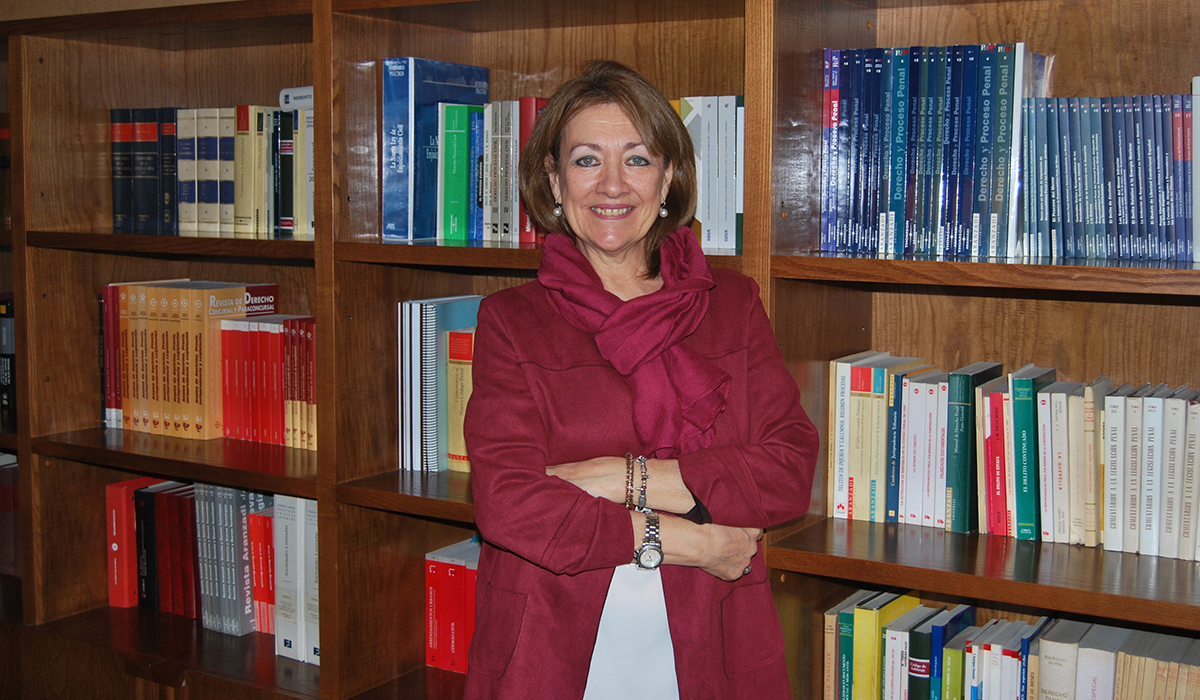
Child theme index:“Every game I put on the Mallorca shirt and add to my history with the club is something magical that I try to enjoy to the full”
Interview with Abdón Prats, RCD Mallorca player
Did you expect a season like this one, both personally and as a group?
If I had to imagine an ideal season on returning to the second division, it’d look like this. We know that a change of coach and way of working is usually complicated. The thing is, this group has been able to adapt perfectly to any change over the years, and I believe that this has been the foundation of its success.
Personally, last year wasn’t easy, and all you want to do is turn the situation around and be an important player. In the beginning, it was difficult, but then, seeing how the team was playing and how I was starting to feel, I noticed that I could contribute my qualities, and I’ve been able to start 11 games, and hopefully, I can play in many more of the remaining games, and we can achieve our goal. If we have the same work ethic as we’ve had up to now, we have a great deal of experience in these situations, and we can achieve something as big as promotion to the First Division.
Anyone with experience in this area says that the key to success in scenarios like this is to know how to deal with dips in performance that always come for every team, would you agree?
Yes, we adapt to any positive or negative situation, and I can say that in these last four years, defeats have made this team stronger. We’re on a high, and that’s huge. I remember that after the defeat against Sporting I spoke to one of our directors and I told him that I was calm because it wouldn’t hurt us, quite the opposite. We react very well when we take blows. But the important thing is not to suffer two defeats in a row and lose ground on your rivals.
What’s Abdón Prats like away from the pitch when football doesn’t dominate his life and isn’t a topic of conversation?
I’m very calm, relaxed. Personally, I like to connect with nature and sail. I disconnect from everything in the middle of the sea. I’m outgoing, and I like to take care of the people around me. But I also have a complicated personality; I can be a bit harsh or unfriendly in some situations. But you can’t always have a smile on your face and be friendly all the time. I realise that as the years go by, I care less about what other people think and things that used to affect you don’t anymore. With experience, both in sporting and personal terms, it’s surprising to see how your mind and your inner self-change, knowing how to handle different situations that could affect you in the day-to-day of competing. I have to go out onto the pitch to enjoy myself, and every game I put on the Mallorca shirt and add to my history with the club is something magical that I try to enjoy to the full. Training at Son Bibiloni and playing at Son Moix is something I’d always dreamed of and to be able to be established in your local team is the best thing that can happen to you.
The last few seasons have been a rollercoaster; what do you take away from these 3 years?
To be able to play and help the club you love and win promotion 2 times, and hopefully a 3rd, that’s what I take away. It’s magical to play for your childhood team when you used to be in the stands at the stadium and wonder if one day you could be on the pitch. To be able to make history here is unbeatable. Sure, everything has happened so quickly in recent years, so tightly packed in a short space of time, so much so that perhaps we don’t enjoy it as much as we should. To be down in Segunda B and get the fans to identify with the team again, with them bursting with emotion, to have that understanding with them and have a connection again, it’s been unique. It’ll go down in history, it’s amazing! Hopefully, in a few months, we’ll be able to say that we’ve achieved 3 promotions in 4 years, which is a real achievement, and it gives me goosebumps just thinking about it. For a homegrown player from Mallorca like me, it’s a huge feat; I can die a happy man. We’re building a golden era for the club that will be one of the most important in the club’s history.
How do you feel when you relive the goal that won your promotion to the First Division against Deportivo La Coruña?
My grandparents came with me to my matches as a child. When we played away from home, they’d leave me on the pitch and for two hours while I played, they’d go for a walk around the town and then pick me up. On the day we won promotion, I told them that I wanted to have the memory of them being there and enjoy that day by my side as they’ve always been, being important people to me. And they came, and we were able to laugh and cry together with joy. I’m thrilled that we had that moment together and that we could give them some joy.
When I hear that goal played live on the radio, I get goosebumps. That Saint John’s Eve night was magical. I remember sitting on the bench before the warm-up and looking up at the half-reddened sky, the sun going down. The atmosphere was unbelievable and the fact that we suffered until the end spiced up the occasion. The cheering of the crowd and seeing everyone jumping up and down is something I’ll never forget and will always be etched on my heart.
Have you thought about what you’re going to do with your life when you hang up your boots?
I haven’t really thought about it yet. I think I’d like to be involved in football and hopefully, I’ll be lucky enough to work at Mallorca, to be able to help the young people. I really like to look at the qualities that the young ones can have, and it’d be a very satisfying thing for me to try to help a lot of players get into the first team, to achieve their dream without getting sidetracked.
Your father-in-law is none other than Héctor Cúper, a living legend of football in Mallorca. Do you often talk about football? Do you ask for his advice or opinion?
We all know what a great figure he is for all Mallorca fans, and when we get together, we talk about training, what we do, and he gives me advice. It’s incredible that we happen to be in each other’s lives and share things in life, him as an icon in the past and me making history these past few years, enjoying the club’s present. It’s funny to be sitting at the same table as him when before I only saw him in photographs in the stadium. I enjoy sharing many football-related experiences with him.
How do you envisage the end of the season going?
I won’t lie to you. We know that we have three really important weeks ahead of us, and if we can get as many points as possible, we’ll have direct promotion of 95% in the bag. I think it’ll be an end to the season in the same vein as we’ve had all year, that it’ll be a success to be able to celebrate something huge again, and that’ll make all Mallorca fans happy.
“I think that the health authorities need to be more aware of the enormous health potential of pharmacists and our pharmacy and distribution model, and they must be more willing to rely on them.”Interview with Eladio González, president of the Apothecary Cooperative of the Balearic Islands and FEDIFAR.
Pharmacists, practitioners of a profession that has provided an essential service throughout the pandemic, have suffered first-hand from the consequences of Covid-19, having been at the front line from the very first minute. What are the main problems they have faced during this time, and how have they been psychologically affected by dealing with patients and their families?
The work carried out by pharmaceutical professionals ever since the onset of the pandemic has been simply extraordinary. Pharmacies, backed by the vital support offered by pharmaceutical distribution companies, have ensured that everyone has had regular access to whatever medication and health products they needed, all while providing an outstanding health service. We mustn’t forget that we have been battling countless difficulties and extremely complicated circumstances throughout the pandemic, both on a professional and personal level. The pharmacy’s doors have remained open at all times, with the pharmacist often being the only health professional available to tend to people’s needs. It has been especially tough for us from a psychological viewpoint during these challenging times, given our close relationship with the general public and our close contact with people when dealing with their health problems. We’ve been faced with some very complicated situations that have taken their toll on us, as you can imagine.
The typical image of a pharmacist is that of someone helping the public. Have pharmacists seen their role grow over this last year as a result of people being more unsettled?
Without a doubt. Both pharmacists and pharmaceutical wholesalers have shown that they are fully committed to helping the public ever since the beginning of these very troubling times. Distributors have been guaranteeing the regular supply of medications and health products to pharmacies and working tirelessly to meet the increased demand for Covid-19 protective material, while pharmacists have been on the front line since the beginning of the pandemic, demonstrating a true vocation for public service and social commitment, ensuring that everyone has access to medication and health advice. A prime example of the supporting role that pharmacies have played during this health crisis – although it’s not necessarily the case in all communities – is the home service that they have provided, delivering medication from hospital pharmacies to patients’ doors to avoid unnecessary hospital visits. This is undoubtedly a service that has significantly been cherished by those who have used a pharmacy throughout the last few months. And that’s what matters most of all to us.
In addition to being a pharmacist and president of the Federation of Pharmaceutical Distributors (FEDER), you also preside over the Apothecary Cooperative. What have been the main challenges faced by the Cooperative over the last year?
To maintain the high level of service that we have been providing until now. This is all thanks to the arduous work carried out by the Cooperative’s workers, employees and executives. I would also like to highlight the structural changes and heroic effort of the human team that often goes unnoticed. The greatest challenge for the Apothecary Cooperative will still be to continue being a loyal, committed and efficient ally to pharmacies, our members and the Balearic public as a whole. This means that we have to keep ensuring that it has fair, quality and safe access to medications through pharmacies. We will continue to reinforce our logistics to become more and more efficient, and we will keep on investing and innovating to provide the best service possible to pharmacies and citizens throughout the Balearics, which is our number one priority.
In your opinion, aside from mass vaccination, what measures are essential for bringing this pandemic to an end as quickly as possible?
Right now, the first step that we need to take in order to leave the pandemic behind as soon as possible is to achieve immunity through the mass vaccination of the islands’ residents. To do this, we need to gather enough vaccines as quickly as we can. Once this happens, we’ll need to analyse everything that has happened during the pandemic to take lessons from it and improve, allowing us to better tackle similar situations in the future. For example, I think that the health authorities need to be more aware of the enormous health potential of pharmacists and our pharmacy and distribution model, and they must be more willing to rely on them. We can go however far the administrations want us to.
Based on your relationship with pharmacists, what do you think the distribution of the different vaccines will be like in the Balearics, and what will the health situation be like next summer, the high season of economic activity on the islands?
Rather than make a prediction, which I think is rather foolish to do in such uncertain times, I’d like to talk about desire. I hope that the vaccination is distributed throughout the Balearics in a manner that is as quick and streamlined as possible so that the greatest number of citizens can be vaccinated as fast as possible. In this situation, speed equals lives. Ideally, a very high percentage of the islands’ population would be vaccinated before the start of the summer. Tourism is the main source of economy in the Balearic, and countless companies and jobs depend on it, which is why I hope this desire becomes a reality so that we can get back to normal by summer. I don’t have a crystal ball, but I’m sure that the health authorities are doing all they can to work towards this goal and they can rely on pharmaceutical professionals and distributors to help them achieve it.
What are Apothecary Cooperative’s intentions for 2021, and which new challenges have arisen?
We have started the year with the best intentions; we can’t have it any other way. We are faced with a significant period of uncertainty which obviously presents us with a considerable challenge, one that we hope to rise to as successfully as possible by throwing all we can at it. A large part of it will depend on the vaccination targets being met, and as a result, society returning to normal. That’s what we want so that 2021 ends up being as successful as possible for all.
“We will feel the effects of Brexit in the longer term…I don’t know if it will be this summer or in 2022”Interview with Antoni Mercant, president of the Chamber of Commerce of Mallorca
Soon it will be a year since the Covid-19 pandemic began. What are the main problems that business people communicate to you, and how do you try to help them from the Chamber of Commerce of Mallorca, for example, managing European funds?
The uncertainty is very distressing. No one can predict exactly when we will get back to normal. There is a glimmer of light at the end of the tunnel, but easing travel restrictions in March will not be the same as easing them in July or September. It is not just a question of dates, but also of regulations, of what we can do today but not tomorrow. The rules are constantly changing. No country in the world has found the perfect solution. This uncertainty makes it difficult for us to plan for the future with all that this entails economically. When will I be able to get my workers out of the ERTE program (Spain’s Temporary Downsizing Plan)? Will my income be enough to support me with so many restrictions? Will I be able to cover all the expenses I still have? When will we see tourists on our streets again?
Given this dire situation, the Chamber of Commerce is assisting business owners. We provide information and advice on existing public aid and continue to offer our free services in collaboration with the various administrations: processing the registration and de-registration of self-employed workers, business plans for women, online processing of export documents, direct aid for technological innovation, etc.
The Spanish Chamber of Commerce recently created a website and a support unit called ‘Operation Transformation’ to gather information on all official calls for projects that can be financed with European funds. It will undoubtedly be an excellent tool for providing advice on the regulatory framework, legislative changes, and procedures applicable to various financing programs.
Because of its public-private nature, I am convinced that the chamber of commerce system will play a key role in the recovery and rebuilding process of our economy that the Next Generation Fund will bring about.
Mallorca’s economy is unquestionably dependent on tourism. What is your organization’s forecast for the coming summer season?
The next few months will be key in determining what kind of summer we will have. First of all, we must get the pandemic under control: we need a swift, rapid vaccination process. And, obviously, restrictions on travel and social contact must be safely lifted. This applies not only in Spain but also in our main source markets. Secondly, we must regain people’s confidence as a safe destination. There is no way we can afford to lose another summer.
In your opinion, do you think that this health crisis will change the islands’ economic model to a greater or lesser extent? Where do you think the future direction of our local economy is headed?
You cannot change the model overnight. But we must take advantage of the situation to improve it. Over the last five decades, the boom of a labor-intensive tourism sector has been a magnet for immigration, doubling the population. Add to this the 15 million tourists who, on average, are concentrated into a three-month period; this pressure overloads the region and leads to social and environmental imbalances.
Given this context, the Chamber of Commerce is committed to economic growth where tourism will undoubtedly continue to be our main economic driver, but which protects our natural resources and improves our citizens’ quality of life. It is difficult to get back the business that we have lost in recent years. But we must fight to restore our agri-food industry and make way for green and blue economies, as well as investing heavily in tech.
From your experience as head of the Chamber of Commerce of Mallorca, have you noticed any new burgeoning sectors of business activity on the island that could provide a boost to our GDP in the short or medium-term?
The yachting industry could be this ideal complement to generate income. We have the best repair and tuning companies in the Mediterranean. This year the Chamber of Commerce has successfully organized the first virtual fair for the Balearic yachting sector, the Balearic Yacht Show, and our goal is to make it a global benchmark. We are already working on the Balearic Marine website to ensure the continuity for the fair and gather all the information related to this industry 365 days a year to be a meeting point between supply and demand and also be a powerful platform for promoting the industry.
In addition to the pandemic’s effects on the islands, there are also Brexit-related repercussions. Can you give us a brief overview of what the major consequences of the UK leaving the EU are on Mallorca?
It is too early to analyze the initial consequences. We haven’t even been treating the United Kingdom as a “third country” for 30 days yet. The agreement entails a transition to the new trade relations that are gradually being implemented. For example, concerning exports of agri-foodstuffs, it was decided which products would be subject to customs control in January and which would not be until March to avoid bottlenecks.
On the other hand, it is obvious that Covid-19 prevents us from seeing the real effects: exports and imports of products are reduced to a minimum and no tourists are coming to our area. We will feel the impact of Brexit in the longer term…I don’t know if it will be this summer or in 2022. We will see how British citizens react to these new rules of the game: Will they sell their vacation homes? Will they stop investing in Mallorca? Will the new customs procedures make our products much more expensive or will we remain competitive for the British market? Will British flagged vessels go with our repair companies?
What goals and new challenges is the Chamber of Commerce of Mallorca facing in 2021?
We have several significant challenges in 2021 that I am convinced will be successfully met. Here are just a few examples, so as not to go on too long: we want to be a benchmark in managing Next Generation Funds; we are working on launching a Digital Transformation Office in March; we have already established this year’s Dona Impuls call for proposals, through which we are providing free business plans for projects led by women in collaboration with IBDona; we want to consolidate the digital platform for export procedures launched this month, and I do not doubt that we will increase the number of beneficiaries of free Youth Guarantee training with the virtual campus that we have just inaugurated.
“Up to 2019 the data was spectacular: as an autumn-winter destination, Palma was growing 6% per year”Interview with Pedro Homar, managing director of the Fundació Turisme Palma 365 of Palma City Council
The scenario the pandemic will leave behind is very uncertain. What is the Fundació Turisme Palma 365 working on at the moment?
Throughout the last few months of the pandemic, we haven’t stopped promoting Palma for a second at the Foundation, reinventing everything to do with tourism promotion. We have been focusing on digital channels and working on the virtual environment, aiming at a very specific target audience and, of course, changing the messages to include items like health safety.
How do you assess this very atypical season currently drawing to a close and what outlook do you have for summer 2021.
The assessment is grim. The only positive thing we could highlight would be the pilot test carried out, which demonstrated Palma’s resilience as a tourist destination. Looking at the future, it’s a changing situation and it’s all very uncertain, but what we have noted is that people are “impatient to travel”.
Do you think that events like these, which have changed our lives since last March, are going to change the tourism model in general, and in the Balearic Islands in particular?
I don’t know if it will change, but I do think it should. We have to be more competitive in what we do well. Currently, technology is one of the cornerstones of tourism promotion.
We have been talking for years about encouraging the de-seasonalisation of tourism on the islands, but dependence on the high season is still high. In the current situation, the role of de-seasonalisation could be key to mitigating the winter economic slowdown. How do you see this from your point of view?
De-seasonalisation is a challenge and the Palma 365 project was set up 8 years ago to meet it. Up to 2019, the data was spectacular: as an autumn-winter destination, Palma was growing 6% per year. But to have good mid-low seasons, we first need to have a great high season.
What challenges is the Fundació Turisme Palma 365 setting for the next few months?
First, to accelerate our digital transformation process, and second, to continue to develop the Plan Impulsa Palma, a three-year project we have been working on throughout the summer, supported by the Ministry of State for Tourism, with 12 structural and contextual projects for the promotion of tourism in the capital with the aim of achieving a 100% digital environment, from the promotion, customer experience, etc., points of view. We must also be capable of communicating the need to make this leap in small and medium-sized companies in particular and, lastly, study how to incorporate smart tourism and database management into our day-to-day promotional strategy.
Interview with Antoni Riera, technical director of the Fundació Impulsa Balears and professor of Applied Economics at the UIB
Allusions to another potential economic crisis have once again become an every-day occurrence in the media. What is your point of view as an economist and what data does Impulsa Balears have to hand to forecast what is to come in the short term?
2019 is ending, in almost all the world’s economic areas, with a lower growth rate than that of the previous year. The Balearic Islands are no exception. The economic forecasts available for 2020 pull down the Balearic Islands’ economic growth marker still further.
Still, the indicators aren’t necessarily pointing towards another recession, but rather towards a period of “low growth” or stagnation as occurred in Japan after its real estate bubble burst in the nineties. The indicators are very clear on this. Most, irrespective of their badge, are losing acceleration, which is a prelude to lower growth rates.
In any event, the intensity and duration of this bout of deceleration will depend, on the demand side, on families’ ability to maintain their expenditure and, on the supply side, on the ability to maintain public and private investment and redirect it towards improvements in productivity. We have sufficient margin to do this. Otherwise we will suffer the consequences in 8 of 10 quarters’ time.
This region’s GDP depends on the tourist industry. What measures should be taken to ensure that our model continues to be an international benchmark and, at the same time, to achieve a strong economy less dependent on the loss of purchasing power in the source markets?
The Balearic Islands is and will continue to be a tourist economy. Nevertheless, we have to acknowledge that the location-prices-rooms equation is getting out-of-date. It no longer guarantees the return we deserve, either from the private or from the social point of view. Improving sector operators’ return on investment and guaranteeing tourism’s contribution to regional revenue and its positive contribution to the social and environmental balance of the islands today means reformulating our strategy. With good reason, reformulating is the first step towards creating a new reality. We have to do away with the idea that the Balearic Islands is a mature destination and start proclaiming that it is a sophisticated destination.
We know the product, we know the channels, we know the customer…We can and must find the formula by which we can stand out based on a very resolute commitment to create more value. Volume no longer highlights our attractiveness.
Can you explain the main role of the Fundació Impulsa Balears, with whom the Bufete Buades law firm works directly.
The Impulsa Balears Foundation is the result of a strategic commitment by CAEB, The Government of the Balearic Islands and an ever-increasing number of companies in the islands, convinced that promoting the archipelago’s global competitiveness is key to facilitating the Balearic Islands’ economy’s transit towards a more advanced state of economic development, in a context in which the islands are rapidly falling back down the order. To do this, the Foundation provides the region’s stakeholders with the strategic knowledge and the mechanisms necessary to move forward together, through the identification of strategic needs, the proposal of new value-generating formulas and the optimum exploitation of the existing capabilities.
If you were responsible for this autonomous region’s economic and employment policies, where would you aim them in order to promote stable business sectors that are alternatives to or complementary to the tourist sector.
If I found myself in that predicament, I would orient policies, not only the economic and employment policies, but also the environmental and social policies, towards focusing on the “how we grow”. Today, most of the proposals that aim to alleviate the tension between the economy-environment and society continue to focus on “how much will we grow” or “how much should we grow”.
However, the solution to our problems is in the “how we grow”. Because behind the “how we grow” hides the degree of efficiency with which society is using the resources it has available. Because behind the “how we grow” hides the degree of innovation a society has when it comes to conceiving technical solutions that enable value creation. Because behind the “how we grow” hides the degree of equity with which society distributes revenue and guarantees the ability of its members to contribute to and benefit from progress.
Three issues: efficiency, innovation and equity, a path on which the Balearic Islands have a long way to go and will find it difficult to complete if they continue to focus on the how much.
The word competitiveness is uttered again and again when talking about the economy. What specific measures are required to strengthen it? Is wage containment absolutely necessary? Doesn’t this directly reduce consumption and therefore companies’ turnovers? What other options are there?
In a rapidly-changing context like the current one, not only is technology, geopolitics changing. The concepts, the paradigms are changing too. Today, we can no longer approach competitiveness from the traditional and reductionist concept of competitiveness-price and put prices, wages and the exchange rate at the centre of a competitiveness strategy. Because nothing today is the same as it was yesterday. Today competitiveness depends on a broad set of factors that determine the ability of a country or region to generate goods and services that meet the requirements of the international markets and to improve the quality of life of its population at the same time.
From this point of view, in the latest reports published by the Impulsa Balears Foundation, the archipelago lies in 173rd place in the global competitiveness index comprised of 264 European regions. This result continues to put the islands in a “low” competitiveness segment that encompasses strengths and profound weaknesses. With this in mind, we obtain a good score in basic pillars –such as health (12), infrastructures (38) and basic education (81)–, but we fail in efficiency drivers –such as higher education (223) and employment market efficiency (196)– and in innovation drivers –mainly in terms of businesses’ sophistication (163) and innovation capacity (195).
We have to improve these positions, there’s no other option. Work on competitiveness to gain in prosperity. Be, in short, both parties to and participants in the future.
Lawyers Aina Sbert and Xisca Company join the Bufete Buades firm
Two young attorneys have joined the Bufete Buades team, each with a strong aptitude for learning and making the most of our profession. Both Aina Sbert and Xisca Company graduated with degrees in law from the Universitat de les Illes Balears (UIB).
Xisca Company
obtained her law degree in 2016 followed by a Master’s degree for Admission to the Bar at UIB, and has since completed professional expert-level university courses in subjects such as tourism law, legislation on tourist accommodation, data protection and compliance with the GDPR, as well as various matters regarding civil liability, including the complex and varied issue of traffic accidents. She will work as an attorney in the firm’s Criminal law y Civil responsibility and damages areas. Xisca Company had known ever since secondary school that she was called to work in a vocation wherein speaking and writing were especially important. ‘Law has an impact on every part of our daily lives. My curiosity led me in this direction’, comments the lawyer who knew that she wanted to practice law and not study for civil service exams.
Aina Sbert also graduated with a degree in law in 2016, continuing on to complete a Master’s degree for Admission to the Bar and one in Corporate Law from ICADE, as well as a Master’s Degree in Financial and Economic Criminal Law, beyond other specialised post-graduate training. Aina Sbert has joined the Credit and bankruptcy law y Commercial and company law areas. Just like her colleague, she is the first in her family to pursue and earn a law degree; her long-held interest in the subject was piqued as a teenager whilst she watched her father’s business interactions with lawyers. ‘I knew from the first day of university that I wanted to work as an attorney’, declares Aina.
We at Bufete Buades extend a warm welcome to our new colleagues and wish them long, successful and satisfying professional careers with us.
“I love working for film, what I hate is the industrialisation of the musical creation process”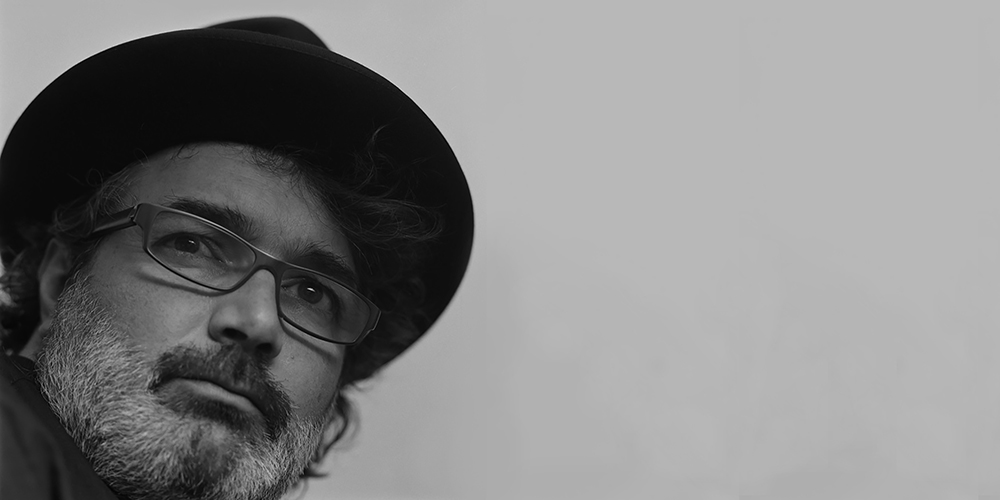
Photo: Alberto García Alix
Interview with the internationally recognised Mallorcan Joan Valent, conductor, composer and musician
How does it feel to be the ‘only living Spanish person published by the Deutsche Grammophon classical music company’?
Yes, it seems this fact has made me legendary.
Well, it’s a nice thing, at least from the emotional point of view. When I was young, a teenager, one of my priorities on picking up a few “shillings” for my birthday was to go to the Galerías Preciados to buy a record by that company, which published all the great conductors, pianists and composers I adored. Being under this same roof is very nice, and shoulders you with a great responsibility in terms of the quality of the music you write and how you have it played. You can’t imagine how demanding they are when you send them a new work and they issue their value judgement on it.
This year you presented your latest work, Poetic Logbook. How would you explain what the record is about to someone who doesn’t know your work? Poetry put to music, melodies put in verse…?
Poetic Logbook is the first record of a trilogy in which I am seeking to show where I am musically and my own path through the world’s poetry, poetry which at a certain time in my life captured me. I consider poetry to be the most sophisticated vehicle human beings have to uplift their existence, to explain the most profound, beautiful and horrible things our species has to offer. The word gives meaning to what we understand, and with the music I try, with the utmost respect, to bind this meaning through the music.
You have sought inspiration in the USA, Mexico and now in Mallorca, which of these three muses has been the love of your life?
Más que perseguir la inspiración, he perseguido la supervivencia y la posibilidad laboral. Durante treinta años he vivido en el extranjero y en Madrid donde podía desarrollar profesionalmente mi oficio. Como arreglista, como compositor para cine, como compositor sinfónico… nunca me gusto la docencia, y el ejercicio de compositor en Mallorca es complejo, no salen muchas oportunidades de las que sacar un mínimo provecho para salir adelante. Ahora es diferente, ya no necesito ir a buscar trabajo, el trabajo me llega, eso es un lujo, y es fruto de muchos años de trabajo. Y en esa situación, el mejor lugar donde escribir, vivir, es sin duda Mallorca.
His work for film has been widely acknowledged outside the classical circuit, with Goya nominations in 2014 for «Witching & Bitching” (Álex de la Iglesia) and the Golden Globes in 2015 for the music from the film “Birdman” (Alejandro González Iñárritu). Nevertheless, you recently said you wouldn’t work for the commercial film industry, why?
I love working for film, what I hate is the industrialisation of the musical creation process. And out of need, or because I had the opportunity, there were years in which I devoted a great deal of my musical production to film, finishing one and starting another, without stopping to think what kind of music I really wanted to make. Now I love being able to choose where I want to work, and this is where the film director and I can develop a common language in which the music and the creative act have a special place, a clear meaning within the film’s dramatic form.
Could you explain when your personal or professional relationship with Bufete Buades began and what it is like now?
My relationship with Bufete Buades started outside the office and for reasons more to do with love than with law. Teresa and Juan are without a doubt friends I keep very close to the heart. With them I have experienced, and continue to experience, moments that are very close to the most beautiful that friendship can provide.
What upcoming professional challenges are you excited about.
Well, next February we are publishing the single of the next record, which will come out in October 2020, and meanwhile, I hope to be filling the world’s theatres with Poetic Logbook. It’s a very exciting life that I hope to share with all of you in Mallorca very soon.
An interview with Maria Frontera, President of the Federación Empresarial Hotelera de Mallorca (FEHM) (Hospitality Business Association of Mallorca)
In the space of barely a month, two different sets of elections have taken place, one national and one regional. These, among many other issues, have affected Balearic Island tourism regulations. What does the FEHM expect for the sector in the immediate future?
We still haven’t managed to get the current government to advance at the same pace as the private hospitality industry, which has made an unprecedented effort to reposition itself. It has contributed significant through diversifying their offer, extending the tourist season, creating employment, improving profitability… Notwithstanding, and as I said, the government has not been agile in this sense and has not stood behind the industry with fiscal incentives for investment, through public events or by improving infrastructure or reducing bureaucratic obstacles.
We need a campaign that showcases and supports the value of tourism. Public-private collaboration, which we have always endorsed, should be real and effective in order to get the positive results our community needs. The political parties that make up our new government body should share this vision of tourism and outline a clear and well-defined road map for it.
Just a few days ago, you were asserting the urgent need for “judicial security” in order to stabilise this industry, which the majority of the families in this community depend on, directly or indirectly. What criteria should these legal guarantees be based upon?
It is essential that tourism be considered a “matter of state” and that a comprehensive tourism policy be enacted, giving tourism the priority it deserves. We demand a broad regulatory framework that comprehensively addresses tourism and is responsive to its transversality.
Another fundamental aspect is the need to reduce administrative burden and fees borne by companies with special attention to the matter of double charges. Government formalities should be simplified, thereby cutting back on fixed costs for companies. We should have a fiscal policy that incentivises, not penalises. These are key issues for improving productivity and competitivity.
One of the hospitality industry’s priorities is continuing with the transformational process that was begun years ago under the 4th additional provision (DA4) of Spanish Law 8/2012 on tourism. To that end, we must have urban regulations that promote investment and provide continuity to hospitality industry reforms. These reforms have made it possible for us to increase quality as well as improve efficiency and the services offered.
One of the topics that currently sparks the most controversy is the regulation of holiday accommodation. What is the FEHM’s opinion on this subject and what does it believe should be done across the diverse accommodation spectrum of shared, single-family, urban and rural accommodation, among others?
The FEHM has always been very clear on this matter. Hired tourism accommodation has always existed and coexisted with hotel accommodation. The problem, as we all know, is rooted in the emergence of commercialisation platforms over which there is absolutely no control. As tends to occur, private development has progressed faster than governmental initiatives, which have been overwhelmed and, once again, “shown up late” due to their slow reaction time.
What we ask is for tourist accommodation to carry the necessary licences since, without them, clandestine operations continue to be protected. Likewise, they should be subject to the tax obligations derived by their operation, whether as natural or legal persons, specifically, the declaration and payment of Spanish personal income tax, value added tax, corporation tax, etc., as applicable.
They should also be subject to quality and service requirements just like the rest of the hospitality industry, and undergo the same inspections as traditional operators. What we want is for tourism inspection to avail of sufficient personnel and material means in order to guarantee compliance with regulations in equal conditions by all players. As of now, it is incomprehensible that the current government does not have powerful technological tools for inspections and cross-reference tourism data with tax agency data in order to detect illegal operations.
In connection with the prior topic, what is your opinion on mass tourism in Mallorca? If you believe this to be the case, what role has holiday accommodation played in this perception?
We need to be very careful about the words we use when we speak about mass tourism. We are continually projecting messages about this and the burden falls upon our outward-looking markets. At specific trade fairs, tourism operators have asked us whether the Balearic Islands have a problem with tourists, and that is worrisome.
It is clear that the emergence of new business models, which have used the misnomer “sharing economy” as an umbrella to defend themselves, jeopardise our islands’ delicate natural balance with the unbounded and uncontrolled growth of this type of offer.
For this reason, we believe that the question is sufficiently important as to merit attention beyond regional government regulations with the intervention of the Spanish national government. They should stop this by passing a national regulatory framework, within their competencies, which is common to all regions in Spain and is aimed at guaranteeing the right to housing, quality of community life and security for companies, workers and our guests, as well as curbing intrusion and the shadow economy. This does not just apply to the hire of accommodation, but also to transport, leisure and business, to mention but a few examples.
Bufete Buades advises the FEHM on legal matters. Which areas tend to require the most legal advice? Is the appearance of new technology for client accommodation and hire systems resulting in new and important cases?
Yes, the FEHM has worked closely with Bufete Buades on highly important matters such as claims against air traffic controllers for the events that occurred in December of 2010. The FEHM makes specialised legal aid concerning the diverse legislation affecting tourism companies at the European, state, regional and local levels available to associated establishments. The most-frequently requested consultations focus on the diverse government procedures regarding the sustainable tourism tax (ITS), intellectual property management, construction law, the practical application of tourism regulations and questions regarding health and food safety, swimming pools, industrial safety and accessibility, among others.
There are so many regulations that apply to the hospitality industry that legal aid has come to be an extremely important player in the FEHM’s activities, both through the legal department and specialised external advisors.
In your opinion, what key business practices should every hospitality establishment in Mallorca implement over the coming years in order not to lose their competitive edge?
First, continue investing. We have invested heavily in quality and in repositioning our hospitality establishments and can boast an investment of 1,800 million euros to date. We need to continue along this path insofar as legislative tools allow us to do so.
Digitalisation is a lever that has changed traditional consumer habits. Today, the Islands are a strategic location for entrepreneurship and the development of tourism technology. The standing government’s involvement is crucial. We need to develop plans for innovation that situate the Spanish tourism industry at the technological forefront as the global leader and tourism powerhouse it is. We also need to implement programmes to help companies develop R&D+i plans with an overarching and integrated vision of tourism.
Furthermore, we need to promote education and training. Available training must correspond to real needs. We need to refocus vocational learning to increase employability in this industry. We are willing to collaborate with the standing government on the design of educational programmes in order to reach this goal.
Whilst the last tourist season on the Islands was particularly noteworthy, a significant decrease in hotel occupancy is predicted for the future. What does the FEHM predict and why?
Just as we have predicted, first at the FITUR fair (Madrid, Spain) and then at ITB (Berlin, Germany), reservations are slowing down as a consequence of a decrease in growth in leading European economies, among other factors.
We are noticing a downturn in reservations, most notably among German and Scandinavian tour operators, owing to a variety of reasons, including the continued rise of competitor destinations along the southern and eastern Mediterranean coast, as well as in Turkey, Egypt, and Tunisia, which enjoyed double digit surges in 2018. That has continued in 2019.
The uncertainty generated by Brexit, the devaluation of the Turkish lira, which makes their tour operator packages more attractive for the price, and the appealing climates in visitors’ home countries in 2018 have already been felt, and everything points to a similar situation for 2019. Domestic travel is a significant source of competition for us,
in addition to the adoption of certain policies, such as unwarranted double taxation in the form of the ITS, which have contributed to the decline in our competitive nature as a destination. These measures do not reflect the great lengths the private sector has gone to in order to improve our tourism product’s positioning and revalorise this destination, actions that have contributed to strengthening the weave of the fabric of regional business.
“Thirty-two years of my life have gone by, during which I loved my work at the firm”Interview with Queta Amengual, Head of Administration of Bufete Buades, recently retired with a career of more than three decades behind her at the firm
1986 was in swing when Queta Amengual entered Bufete Buades for the first time to work with the office. At that moment, “Who could have known that this would be my home for more than three decades?” recalls the woman who was its financial director over the last decades. For Amengual, this whole timespan was a very important life experience. “Thirty-two years of my life have gone by, during which I loved my work at the firm. A lot.”
Halfway through the 1980s, Queta enjoyed a comfortable, stable placement in a government agency that, in her own words, was monotonous. “A mutual friend told me that the firm was looking for someone who could help them out in the afternoons. I was interested in increasing my earnings, so I said yes. One year later, in 1987, they offered me a full-time contract and I didn’t even think twice about it. That didn’t go over so well with my family because of the uncertainty that comes with leaving a stable job that you basically have for life to go to an unknown job in the private sector, but I had already made the decision. I knew what I wanted,” relates the Majorca native. Feeling motivated about your work and living with that essential professional tension that helps you to solve problems and face the challenges set in front of you is too sweet a joy not to jump for “I learned a lot, jumped both feet first into work and I developed a very close relationship with Joan and Teresa from the very start. I liked going to work every day and my family felt that right away. They soon forgot their fears about having left my old job,” Queta recalls clearly. Neither has she forgotten that she worked together with Antonio Tugores, who had joined the firm barely a fortnight beforehand and with whom she “really hit it off”.
Her life reached a turning point with the arrival of her first daughter. Our protagonist tells the story: “My old company offered me the option of coming back to help balance my career with maternity leave. I presented the idea to the firm because I didn’t want my obligations as a mother to be a burden to them. They told me to put it out of my head, that they wanted me to stay. They offered me part-time work so that I could balance it with my personal life. That was when it was absolutely proven to me that they were truly great people, and most of all, how much I really liked them. I decided to turn down the first offer and stay with them.”
All of this came to pass when the Bufete Buades offices were still located on Sant Miquel street in Palma. The change of headquarters to Jaume III came with the 90s, and with it, the growth of the office staff, progressively integrating new members into the management and legal teams. After a growth period, the firm consolidated during the first decade of the 21st century, which simultaneously meant a large professional change for Queta Amengual in the company. “Teresa was going to stop taking on the office’s financial duties and Joan suggested that I take over responsibility for management. I didn’t know anything about managing the financial part of a company, nor about the responsibilities involved in management, but I loved the proposal and, even if it frightened me, I accepted with it all of the excitement and energy I could muster. I put my heart and soul into learning to understand and appreciate my new work, to learn the language and know the concepts so I could perform my new tasks with ease, respond positively and maintain the trust they had placed in me,” explains Bufete Buades ex-manager.
When we ask what she’s taking away from all of these thirty-plus years of professional association with the firm, Queta doesn’t hesitate for a second: “Personally speaking, I won’t ever forget the immense love and respect that my father felt for Teresa and Joan. He was so thankful for the opportunity that they gave me… If I had to hold on to a challenge, the biggest one would be having had to learn everything from scratch about numbers and the firm’s accounting, no doubt about it. And in terms of general memories, what comes to mind when I think of Bufete Buades, and I wouldn’t give it up for anything, is the absolute camaraderie and teamwork over my long career with the firm, I think. My colleagues have been and continue to be, for me, friends. Very, very good friends. And, of course, I’ll take away the memory of how well I got along with the majority of clients that, still today, if we pass each other in the street, they stop to say hello. This is my summary of the best memories I’m taking away from my thirty-two years in the office.”
Gabriel Buades at the private viewing of the Federico Miró exhibition at Gallery Red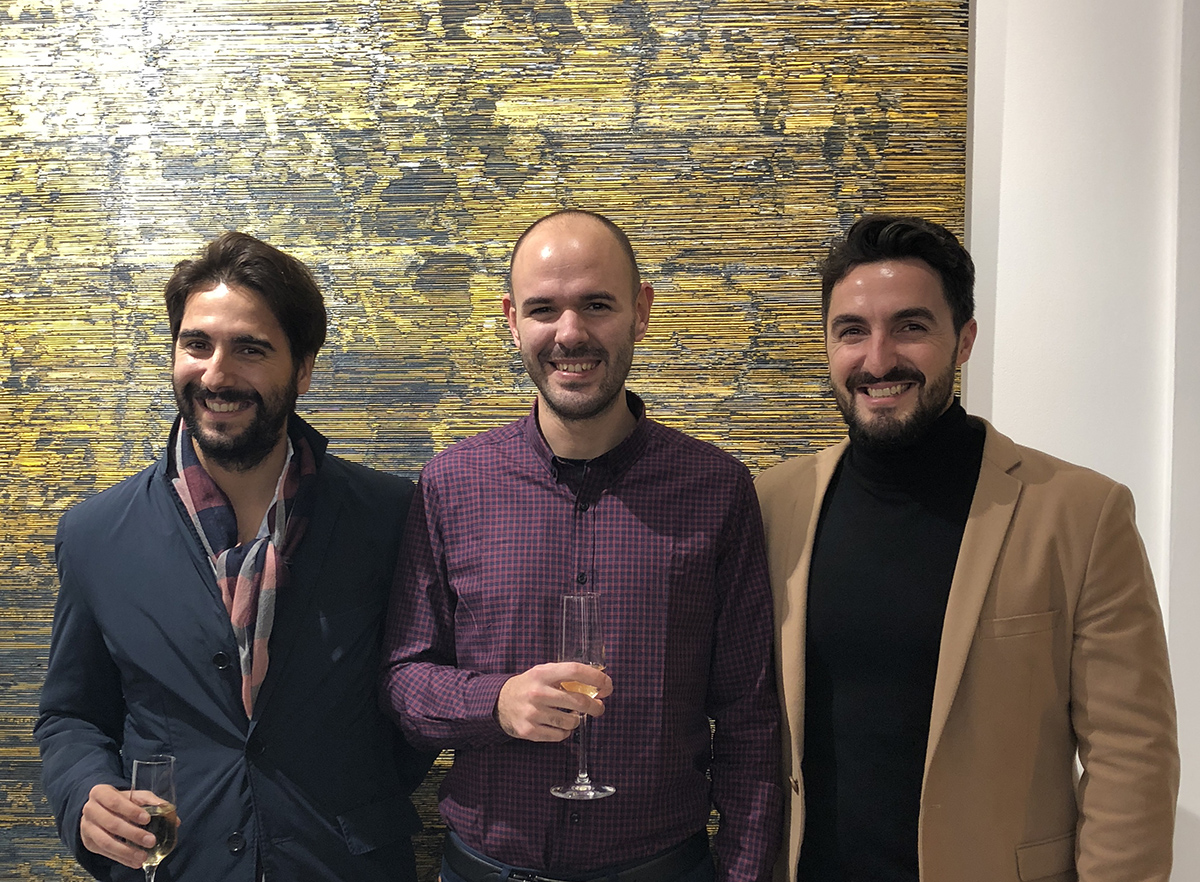
Last 30 November, Gallery Red hosted a private viewing of painter Federico Miró‘s first ever exhibition in Mallorca. Gabriel Buades, a lawyer from the Bufete Buades firm, was present at the event, where he enjoyed the four works displayed by the artist, who hails from Málaga. These works will be on exhibit to the public until January 2019.
Gallery Red is no humdrum gallery. In this space, contemporary art, design and fashion flow together, blending into the pleasure of this unique Palma shopping experience. Modern lifestyle, the most iconic design, exclusive contemporary art and signature fashion accessories from the most distinguished designers mingle here. Founders Drew Aaron and Hana Soukopová were recently interviewed in the special edition Fuera de Serie released by the daily publication Expansión.


